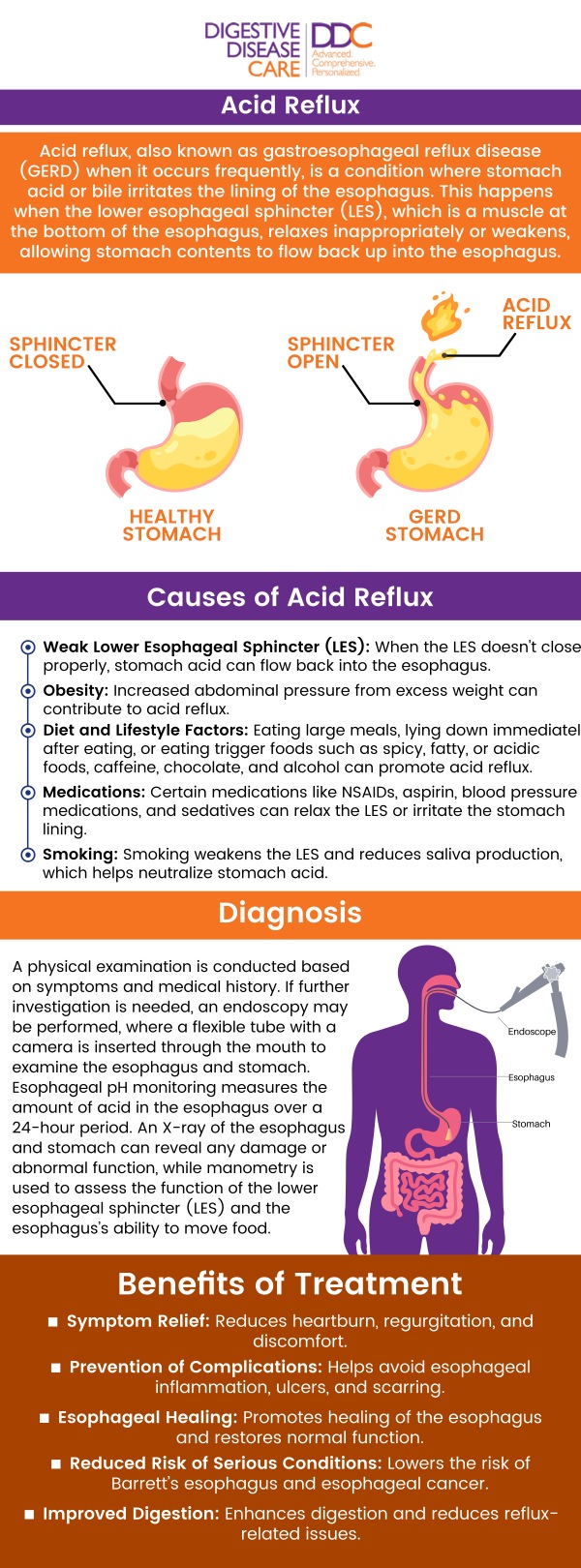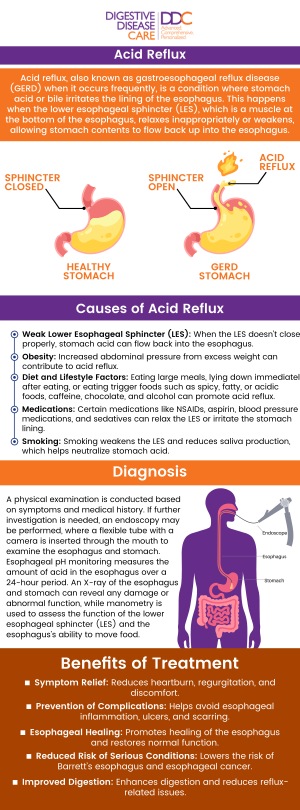Acid Reflux vs. Heartburn: What’s the Difference?
Acid reflux is a severe burning sensation in the center of your chest produced by esophageal lining irritation caused by stomach acid. This burning can occur at any moment, but it is usually worse after eating. Many people’s heartburn worsens when they recline or lie in bed, making it difficult to obtain a decent night’s sleep. Treatment is available at Digestive Disease Care (DDC). For more information, please contact us or book an appointment online. We have convenient locations to serve you in Babylon NY, East Setauket NY, Forest Hills NY, Jericho NY, Lake Success NY, Melville NY, Mineola NY, Massapequa NY, New Hyde Park NY, and Riverhead NY.




Table of Contents:
What does acid reflux feel like?
What are the four types of acid reflux?
Can you have acid reflux without heartburn?
What is the difference between heartburn and acid reflux?
How do I know if my heartburn is serious?
One of the most common symptoms of acid reflux is heartburn. The term “heartburn” is misleading, as the symptom has nothing to do with the heart organ. Heartburn occurs within the digestive tract, specifically in the esophagus. When experiencing heartburn, many describe it as a burning sensation in the chest, neck, throat, or behind the breastbone. The burning sensation is also sometimes described as a pressure or discomfort in the chest area. Some report the pain worsening when lying down or bending over. It is common for heartburn to last from several minutes to a few hours. Sometimes, heartburn can be mistaken for heart attack pain, as both are characterized by discomfort in the chest.
Acid reflux is a common condition that can range in terms of severity and be categorized into four types or stages. The different types of acid reflux are:
• Mild acid reflux – This type of acid reflux is the most common and occurs occasionally, Symptoms may include heartburn, trouble swallowing, and regurgitation. The recommended course of treatment at this stage often begins with altering lifestyle choices to prevent acid reflux.
• Moderate acid reflux – Moderate acid reflux occurs several times a week and can affect daily activities if left untreated. Symptoms are similar to those of mild acid reflux, but occur much more frequently and can be slightly more severe. It is recommended to see a physician if you experience moderate acid reflux.
• Severe acid reflux – This stage of acid reflux is characterized by symptoms such as chronic coughing, sore throat, heartburn, and regurgitation. Those with severe acid reflux are at high risk of developing further complications, so it is highly advised to seek treatment.
• Esophageal cancer – After several years of untreated, severe acid reflux, there is a risk of developing esophageal cancer. It is crucial to seek treatment from a specialist to prevent and reverse the damage.
It is possible to experience acid reflux without heartburn. Though heartburn is a very common symptom of acid reflux, there are many other symptoms that can be more prevalent. Other symptoms of acid reflux include:
• Cough
• Sore throat
• Sour or bitter taste in the mouth
• Belching
• Vomiting or nausea
• Trouble swallowing
Overall, the symptoms of acid reflux vary from person to person. It is possible to experience acid reflux without experiencing heartburn, though heartburn is one of the most common symptoms of acid reflux.
The terms “acid reflux” and “heartburn” are sometimes used interchangeably. However, the two terms have different meanings. Acid reflux is a medical condition in which stomach acid is pushed up into the esophagus, causing inflammation and irritation. Heartburn is a common symptom of acid reflux; it is estimated that around 60 million Americans have heartburn every month. Heartburn is a symptom of other conditions as well, such as gastroesophageal reflux disease, or GERD. Overall, heartburn is most commonly a result or symptom of acid reflux.
Heartburn is a common occurrence and often nothing to worry about. However, it can be worrisome, as the sensation of heartburn can be mistaken for symptoms of a heart attack. If you have persistent chest pain that you aren’t sure is heartburn and lasts several hours, it is advised that you seek medical attention right away to rule out other conditions such as a heart attack. Furthermore, it is recommended that you consult a specialist if you experience:
• Severe abdominal pain
• Frequent or constant heartburn
• Persistent cough or hiccups
• Persistent nausea or vomiting
• Intense difficulty swallowing or keeping food down
• Heartburn symptoms despite taking prescription medicines
• Discomfort which interferes with day-to-day life
• Substantial weight loss
It is important to treat heartburn if it interferes with your daily activities or lifestyle. Treatment prevents heartburn from worsening and developing into other conditions such as narrowing of the esophagus, GERD, chronic cough, and, in extreme circumstances, esophageal cancer.
For more information, please contact us or book an appointment online. We have convenient locations to serve you in Melville NY, New Hyde Park NY, Forest Hills NY, Jericho NY, Mineola NY, Lake Success NY, Babylon NY, East Setauket NY, Massapequa NY, Riverhead NY and BEYOND.

Check Out Our 5 Star Reviews


Additional Services You May Like

Additional Services You May Like
- Abdominal Pain
- Acid Reflux
- Barretts Esophagus
- Bloating
- Capsule Endoscopy
- Celiac Disease
- Colon Cancer Screening
- Colonoscopy
- Constipation
- Crohns Disease
- Diarrhea
- Diverticulitis
- Esophageal PH Monitoring
- Fatty Liver
- Fibroscan
- Gallstones
- Gastroenterologist
- Gastric Chest Pain
- Gluten Intolerance
- Hemorrhoid
- Hemorrhoid Banding
- Hepatitis
- Irritable Bowel Syndrome
- Lactose Intolerance
- Pancreatitis
- Polyps
- Rectal Bleeding
- Stomach
- Ulcerative Colitis
- GI Urgent Care





